#fictional narratives
Text
always a fun time when real life people are doomed by their own narratives. like guys you know it doesn’t have to be like this right? this isn’t a stageplay the foreshadowing isn’t real until you make it real
#what do roman senators rock stars and real pirates have in common#i would love to write a magical realism psychological horror movie about a up-and-coming celebrity#in which the premise is that the more and more you garner a parasocial following#(i.e.#the more and more you are treated like a character instead of a real person)#the more you become subject to the rules of fiction and thus narrative fate#and the protagonist slowly but surely realizes that by becoming famous they’ve sold away their own ontology#//#god. i need to find that sexy quote from pete townshend about how the music industry is perpetuated on human sacrifice
5K notes
·
View notes
Text
I’m actually serious about this, if at all possible, right now is a very good time to request queer books from your local library. Whether they get them or not is not in your control, but it is so important to show that there is a desire for queer books. I will also say getting more queer books in libraries and supporting queer authors are pretty fantastic byproducts of any action.
This isn’t something everyone can do, but please do see if you are one of the people who has the privilege to engage in this form of activism, and if you are, leverage that privilege for all you’re worth.
For anyone who can’t think of a queer book to request, here is a little list of some queer books that I think are underrated and might not be in circulation even at larger libraries:
Refusing Compulsory Sexuality: A Black Asexual Lens on Our Sex-Obsessed Culture by Sherronda J. Brown
Silver Under Nightfall by Rin Chupeco
Harvard's Secret Court: The Savage 1920 Purge of Campus Homosexuals by William Wright
The Perks of Loving a Wallflower by Erica Ridley
God Themselves by Jae Nichelle
IRL by Tommy Pico
The Pink Line: Journeys Across the World's Queer Frontiers by Mark Gevisser
Passing Strange by Ellen Klages
The New Queer Conscience by Adam Eli
Fierce Femmes and Notorious Liars: A Dangerous Trans Girl's Confabulous Memoir by Kai Cheng Thom
Queering the Tarot by Cassandra Snow
Wash Day Diaries by Jamila Rowser
Queer Magic: Lgbt+ Spirituality and Culture from Around the World by Tomás Prower
Before We Were Trans: A New History of Gender by Kit Heyam
Beyond the Pale by Elana Dykewomon
Hi Honey, I'm Homo! by Matt Baume
The Deep by Rivers Solomon
Homie: Poems by Danez Smith
The Secret Life of Church Ladies by Deesha Philyaw
The Companion by E.E. Ottoman
Kapaemahu by Dean Hamer, Joe Wilson, Hinaleimoana Wong-Kalu
Sacrament of Bodies by Romeo Oriogun
Witching Moon by Poppy Woods
Tell Me I'm Worthless by Alison Rumfitt
Dead Collections by Isaac Fellman
Disintegrate/Dissociate by Arielle Twist
Dear Senthuran: A Black Spirit Memoir by Akwaeke Emezi
Peaches and Honey by Imogen Markwell-Tweed
Nepantla: An Anthology Dedicated to Queer Poets of Color by Christopher Soto
#queer books#queer history#lgbt history#honestly#libraries are a massive resource in terms of preserving and uplifting marginalized narratives#and as a community#that has been so very excluded from both fictional and nonfictional narratives#this is a great way to reclaim and care for the stories that have been surpressed for so long
11K notes
·
View notes
Text
Writing Notes: The Shape of Story

by Christina Wodtke
Start with Conflicted Characters
The character needs a goal, a motivation and a conflict.
The goal can be alien to your audience,
but the motivation must be shared by them, and
the conflict creates struggles that increase engagement.
Paint a Picture
Details transport you into the story.
The world disappears and you have a story play in your head.
Even though there are no literal pictures.
But be careful—Too many details and the story gets bogged down.
Make the Protagonist Suffer
“Be a Sadist. No matter how sweet and innocent your leading characters, make awful things happen to them - in order that the reader may see what they are made of.” (Kurt Vonnegut, How to Write a Great Story)
And when it can’t get any worse, make it worse before it gets better
The two key moments that create the peak of excitement in a story is the darkness before the dawn, and the dawn.
The climax is the moment when the protagonist is either rescued or rescues themself.
In older tales, we saw a lot of Deux ex Machina (the hand of god) rescuing the hero. A hero could be rescued by luck, a partner, another hero…but modern audiences strongly prefer stories where the protagonist helps themself.
Resolution is Boring, Keep it Short
Interest grows with every additional conflict, but once the hero figures out the solution, our fascination collapses.
Don’t natter on while the audience’s mind is drifting.
Also Consider:
You need a good inciting incident to move your protagonist to action.
A setting is more than a place, it’s a situation and a moment in time. A vivid place has details.
Modern audiences prefer “return home changed” to “return home the same.”
EXAMPLES: ARCHETYPAL PLOTS ALONG THE ARC
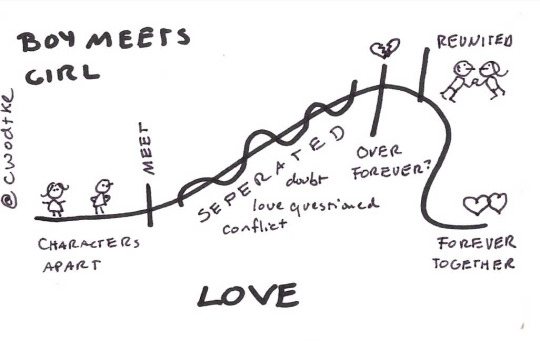
Boy Meets Girl
Internal conflict is always satisfactory (e.g., she believes love interferes with his career, he believes love interferes with his beer.)
The crises usually revolves around betrayal — lying, cheating — and the climax shows it was a misunderstanding or we get atonement.
The struggle is always about them being separated.
The resolution is about binding them more tightly together than ever.

The Quest
You seek things, and find yourself.
Return home changed and don’t pass go.
Common elements include companions, a mentor, great losses and extreme character arcs.

The Underdog
Even though they do not have a shot in hell, the underdog wants something. They want it so bad.
Common elements include an enemy who blocks their path, and a coach who helps them forward.
In this case, they do not return home changed but rather move into a new life that fits their changed self.

Coming of Age
Naive person has the world teaches them a hard lesson, and they become a better person for it.
Struggle revolve around life sucking and then sucking more.
The hero grows and becomes better because of it, and via new understandings becomes competent.
In some tragedies, the world breaks them.
They can return home changed, but more often they move to a new life they have earned.
More Examples. Justice & Pursuit:


Weaving Multiple Plots:

Weaving multiple plots together to make subplots can further increase tension.
Multiple plots woven together makes the whole story not only unique but very compelling.
#writing notes#plot#narrative arc#writeblr#dark academia#writing reference#spilled ink#writing prompt#writers on tumblr#poets on tumblr#literature#poetry#fiction#story#creative writing#on writing#writing tips#writing advice#writing inspo#writing inspiration#writing ideas#studyblr#light academia#writing resources
1K notes
·
View notes
Text
i love you fairy tales i love you folklore i love you myths i love you stories as old as humanity itself i love you oral traditions i love you characters carried through time on my ancestors’ tongues i love you story i’ve seen a million ways and want to see a million more i love you archetypes i love—
20K notes
·
View notes
Text
hey did you know that slay the princess is out now? did you know it's on sale with a 10% launch discount until november 2nd? do you want to spend several hours getting sternly lectured by and annoying jonathan sims?? well this is your game
i think it's good and you should buy it but don't listen to me look at that 91 metascore—and for us, just a couple of lil guys make a game with no gameplay other than click dialogue options! idk must be fun
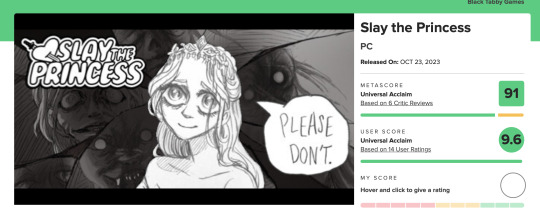
“An existentially horrific visual novel, with an incredibly well-written plot, a beautiful score and graphics that will enrapture all senses. One of the best narrative games of 2023.”
10/10 – Voxel Smash
“There isn’t a single thing I don’t like about Slay the Princess. The presentation is beautiful, the story is fantastic and moving, the voice acting of amazing characters is done phenomenally well, and the branching paths of the story give you what feels like unlimited possibilities.”
10/10 – Try Hard Guides
“Slay the Princess will stay with you for a long time, I think. It’s absurdist and dark and haunting in a way that not a lot of games are. If you have an itch for something that’s spooky but also morally confronting and you will be thinking about it for days to come, it’s impossible not to recommend this.”
A- – Player 2
Anyways more seriously truly from the bottom of our hearts thank you all so much for making this launch a world-shifting experience for us! We can't wait to share more games with you, starting with Episode 5 of Scarlet Hollow 👀
#slay the princess#scarlet hollow#jonathan sims#nichole goodnight#indie games#visual novel#interactive fiction#narrative design#gamedev#horror game#horror games
3K notes
·
View notes
Text
Against Lore

For the rest of May, my bestselling solarpunk utopian novel THE LOST CAUSE (2023) is available as a $2.99, DRM-free ebook!

One of my favorite nuggets of writing advice comes from James D Macdonald. Jim, a Navy vet with an encylopedic knowledge of gun lore, explained to a group of non-gun people how to write guns without getting derided by other gun people: "just add the word 'modified.'"
As in, "Her modified AR-15 kicked against her shoulder as she squeezed the trigger, but she held it steady on the car door, watching it disintegrate in a spatter of bullet-holes."
Jim's big idea was that gun people couldn't help but chew away at the verisimilitude of your fictional guns, their brains would automatically latch onto them and try to find the errors. But the word "modified" hijacked that impulse and turned it to the writer's advantage: a gun person's imagination gnaws at that word "modified," spinning up the cleverest possible explanation for how the gun in question could behave as depicted.
In other words, the gun person's impulse to one-up the writer by demonstrating their superior knowledge becomes an impulse to impart that superior knowledge to the writer. "Modified" puts the expert and the bullshitter on the same team, and conscripts the expert into fleshing out the bullshitter's lies.
Yes, writing is lying. Storytelling is genuinely weird. A storyteller who has successfully captured the audience has done so by convincing their hindbrains to care about the tribulations of imaginary people. These are people whose suffering, by definition, do not matter. Imaginary things didn't happen, so they can't matter. The deaths of Romeo and Juliet were less tragic than the death of the yogurt you had for breakfast. That yogurt was alive and now it's dead, whereas R&J never lived, never died, and don't matter:
https://locusmag.com/2014/11/cory-doctorow-stories-are-a-fuggly-hack/
Hijacking a stranger's empathic response is intrinsically adversarial. While storytelling is a benign activity, its underlying mechanic is extremely dangerous. Getting us to care about things that don't matter is how novels and movies work, but it's also how cults and cons work.
Cult leaders and con-artists know that they're engaged in mind-to-mind combat, and they make liberal use of Jim's hack of leaving blank spots for the mark to fill in. Think of Qanon drops: the mystical nonsense was just close enough to sensical that a vulnerable audience was compelled to try and untangle them, and ended up imparting more meaning to them than the hustler who posted them ever could have dreamt up.
Same with cons – there's a great scene in the Leverage: Redemption heist show where an experienced con-artist explains to a novice that the most convincing hustle is the one where you wait for the mark to tell you what they think you're doing, then run with it (scambaiters and other skeptics will recognize this as a relative of the "cold reading," where a "psychic" uses your own confirmations to flesh out their predictions).
As Douglas Adams put it:
A towel has immense psychological value. For some reason, if a strag (strag: non-hitch hiker) discovers that a hitch hiker has his towel with him, he will automatically assume that he is also in possession of a toothbrush, face flannel, soap, tin of biscuits, flask, compass, map, ball of string, gnat spray, wet weather gear, space suit etc., etc. Furthermore, the strag will then happily lend the hitch hiker any of these or a dozen other items that the hitch hiker might accidentally have "lost". What the strag will think is that any man who can hitch the length and breadth of the galaxy, rough it, slum it, struggle against terrible odds, win through, and still knows where his towel is is clearly a man to be reckoned with.
Magicians know this one, too. The point of a sleight is to misdirect the audience's attention, and use that moment of misattention to trick them, vanishing, stashing or producing something. The mark's mind is caught in a pleasurable agony: something seemingly impossible just happened. The mind splits into two parts, one of which insists that the impossible just happened, the other insisting that the impossible can't happen.
You know you've done it right if the audience says, "Do that again!" And that's the one thing you must not do. So long as you don't repeat the trick, the audience's imagination will chew on it endlessly, coming up with incredibly clever things that you must have done (a clever conjurer will know several ways to produce the same effect and will "do it again" by reproducing the effect via different means, which exponentially increases the audience's automatic imputation of clever methods to the performer).
Not for nothing, Jim Macdonald advises his writing students to study Magic and Showmanship, a classic text for aspiring conjurers:
https://memex.craphound.com/2007/11/13/magic-and-showmanship-classic-book-about-conjuring-has-many-lessons-for-writers/
There's a version of this in comedy, too. The scholarship of humor is clear on this: comedy comes from surprise. The audience knows they're about to be surprised when the punchline lands, and their mind is furiously trying to defuse the comedian's bomb before it detonates, cycling through potential punchlines of their own. This ramps up the suspense and the tension, so when the comedian does drop the punchline, the tension is released in a whoosh of laughter.
Your mind wants the tension to be resolved ASAP, but the pleasure comes from having that desire thwarted. Comedy – like most performance – has an element of authoritarianism. You don't give the audience what it wants, you give it what it needs.
Same goes for TTRPGs: the game master's role is to deny the players the victories and treasure they want, until they can't take it anymore, and then deliver it. That's the definition of an epic game. It's one of the durable advantages of human GMs over video game back-ends: they can ramp up the epicness by "cheating" on the play, giving the players the chance to squeak out improbable victories at the last possible second:
https://wilwheaton.typepad.com/wwdnbackup/2009/03/behind-the-screen.html
This is so effective that even crude approximations of it can turn video-games into cult hits – like Left4Dead, whose "Director" back-end would notice when the players were about to get destroyed and then substantially ramped up the chances of finding an amazing weapon – the chance would still be low overall, but there would be enough moments when the player got exactly what they'd been praying for, at the last possible instant, that it would feel amazing:
https://left4dead.fandom.com/wiki/The_Director#Special_Infected
Critically, Left4Dead's Director didn't do this every time. As any showman knows, the key to a great performance is "Always leave 'em wanting more." The musician's successful finale depends on doing every encore the audience demands, except the last one, so the crowd leaves with one tantalyzing and imaginary song playing in their minds, a performance better than any the musicians themselves could have delivered. Like the gun person who comes up with a cooler mod than the writer ever could, like the magic show attendee who comes up with a more elaborate explanation for the sleight than the conjurer could ever pull off, like the comedy club attendee whose imagination anticipates a surprise that grows larger the longer the joke goes on, the successful performance is an adversarial act of cooperation where the audience willingly and unwillingly cooperates with the performer to deny them the thing that they think they need, and deliver the thing they actually need.
This is my biggest problem with the notion that someday LLMs will get good enough at storytelling to give us the tales we demand, without having to suffer through a storyteller's sadistic denial of the resolutions we crave. When I'm reading a mystery, I want to turn to the last page and find out whodunnit, but I know that doing so will ruin the story. Telling the storyteller how the story should go is like trying to tickle yourself.
Like being tickled, experiencing only fun if the tickler respects your boundaries – but, like being tickled, there's always a part where you're squirming away, but you don't want it to stop. An AI storyteller that gives you exactly what you want is like a dungeon master who declares that every sword-swing kills the monster, and every treasure chest is full of epic items and platinum pieces. Yes, that's what you want, but if you get it, what's the point?
Seen in this light, performance is a kind of sado-masochism, where the performer delights in denying something to the audience, who, in turn, delights in the denial. Don't give the audience what they want, give them what they need.
What your audience needs is their own imagination. Decades ago, I was a freelance copywriter producing sales materials for Alias/Wavefront, a then-leading CGI firm that was inventing all kinds of never-seen VFX that would blow people away. One of the engineers I worked with told me something I never forgot: "Your imagination has more polygons than anything you can create with our software." He was talking about why it was critical to have some of the action happen in the shadows.
All of this is why series tend to go downhill. The first volume in any series leaves so much to the imagination. The map of the world is barely fleshed out, the characters' biographies are full of blank spots, the mechanics of the artifacts and the politics of the land are all just detailed enough that your mind automatically ascribes a level of detail to them, without knowing what that detail is.
This is the moment at which everything seems very clever, because your mind is just churning with all the different bits of elaborate lore that will fill in those lacunae and make them all fit together.
SPOILER ALERT: I'm about to give some spoilers for Furiosa.
.
.
.
.
.
.
.
.
FURIOSA SPOILERS AHEAD!
Last night, we went to see Furiosa, the latest Mad Max movie, a prequel to 2015's Fury Road, which is one of the greatest movies ever made. Like most prequels, Furiosa functions as a lore-delivery vehicle, and as such, it's nowhere near as good as Fury Road.
Fury Road hints as so much worldbuilding. We learn about the three fortresses of the wasteland (the Citadel, the Bullet Farm, and Gastown) but we only see one (The Citadel). We learn that these three cities have a symbiotic relationship with one another, defined by a complex politics that is just barely stable. We meet Furiosa herself, and learn something of her biography – that she had been stolen from the Green Place, that she had suffered an arm amputation.
All of this is left for us to fill in, and for a decade, my hindbrain has been chewing on all of that, coming up with cool ways it could all fit together. I yearned to know the "real" explanation, but it was always unlikely that this real explanation would be as enjoyable as my own partial, ever-unfinished headcanon.
Furiosa is a great movie, but its worst parts are the canonical lore it settles. Partly, that's because some of that lore is just stupid. Why is the Bullet Farm an open-pit mine? I mean, it's visually amazing, but what does that have to do with making bullets? Sometimes, it's because the lore is banal – the solarpunk Green Place is a million times less cool than I had imagined it. Sometimes, it's because the lore is banal and stupid: the scenes where Furiosa's arm is crushed, then severed, then replaced, are both rushed and quasi-miraculous:
https://www.themarysue.com/how-does-furiosa-lose-her-arm/
But even if the lore had been good – not stupid, not banal – the best they could have hoped for was for the lore to be tidy. If it were surprising, it would seem contrived. A story whose loose ends have been tidily snipped away seems like it would be immensely satisfying, but it's not satisfying – it's just resolved. Like the band performing every encore you demand, until you no longer want to hear the band anymore – the feeling as you leave the hall isn't satisfaction, it's exhaustion.
So long as some key question remains unresolved, you're still wanting more. So long as the map has blank spots, your hindbrain will impute clever and exciting mysteries, tantalyzingly teetering on the edge of explicability, to the story.
Lore is always better as something to anticipate than it is to receive. The fans demand lore, but it should be doled out sparingly. Always leave 'em wanting more.

If you'd like an essay-formatted version of this post to read or share, here's a link to it on pluralistic.net, my surveillance-free, ad-free, tracker-free blog:
https://pluralistic.net/2024/05/27/cmon-do-it-again/#better_to_remain_silent_and_be_thought_a_fool_than_to_speak_and_remove_all_doubt
#pluralistic#writing#lore#series#science fiction#the elaborations of a bad liar#always leave em wanting more#james d mcdonald#guns#pilkunnussija#craft#Silmarillion#sf#Better to Remain Silent and Be Thought a Fool than to Speak and Remove All Doubt#magic tricks#conjuring#narrative#mad max#furiosa
1K notes
·
View notes
Note
Any general thoughts on/relating to the Brobot?
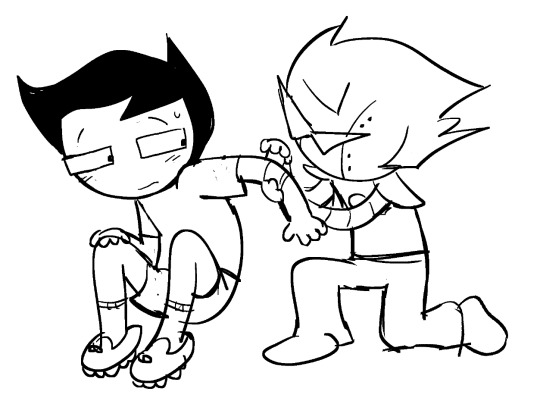



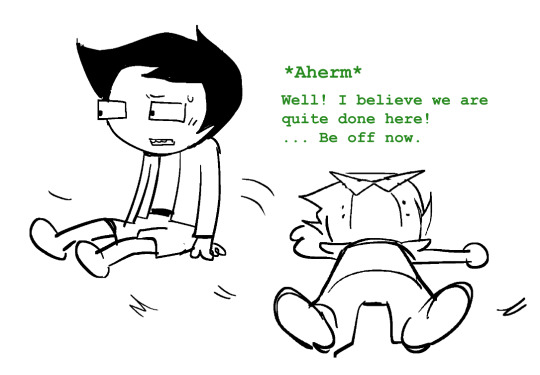

Have my half awake scrawlings...
I really love the brobot!!!! People really misconstrue it and also leave it out in a lot of dirkjake talk? Its a big player in not only how dirk expresses his affection/desire towards jake but also in their multi year spanning unspoken game of gay chicken 😭😭(all of dirks splinters are but Not about them rn)
It was sent yknow under the pretense that jake loves wrestling and wished so bad to have somebody he could wrestle with. But at the same time it protects jake from the horrors of hellmurder island (seen before they strife), pushing jake into the Damsel in distress role he wasnt expecting to play even before all the shit in the game, with Dirk being his hero.
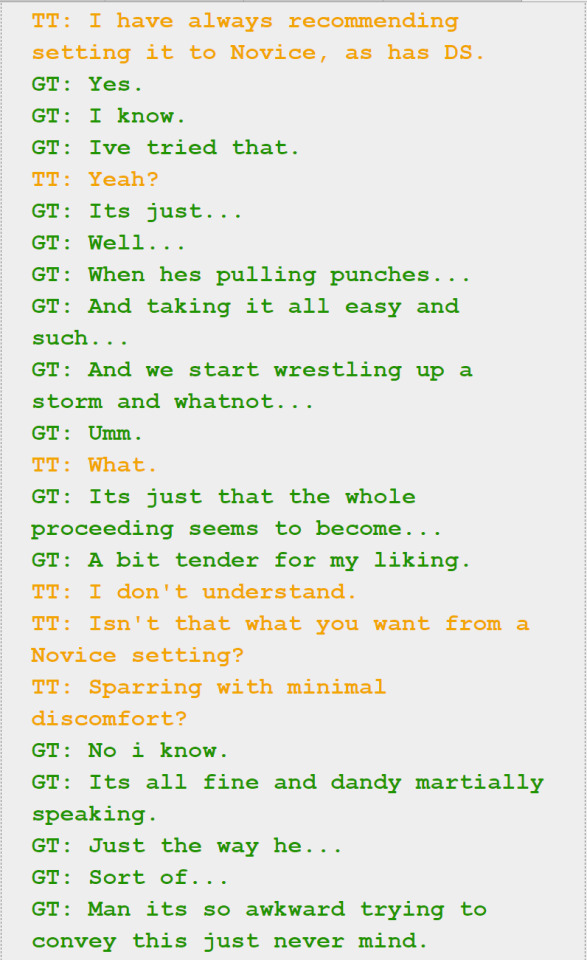
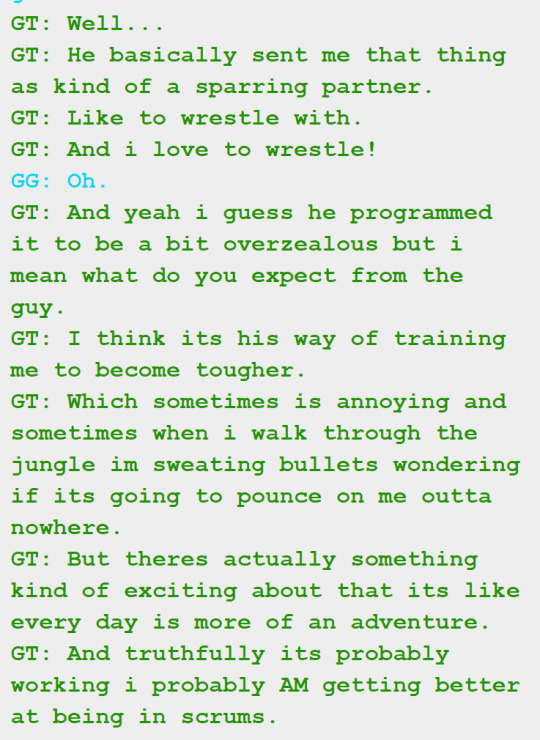
Jake says he keeps it on a high difficulty because apparently in the Novice mode he says their interactions become "too tender" and doesnt want to elaborate, Friendly reminder! His convo with jane on the SAME DAY dirk pulled off that big romantic overture and the kiss happens and him and dirk begin "dating".. is the same day he asked jane if it didnt make him weird for wanting to date dirk. And he also says hed joke around with dirk about how theyd soo make a great couple if dirk were a girl haha.
I imagine the brobot and well. Getting physical like that with a robot that supposedly looks like dirk probably gave jake his internal gay awakening at 13 but he just never wanted to actually confront it and instead just wanted to brush past everything 😭😭 (See: every single time sexuality or romance comes up in relation to jake he is literally always thinking about dirk somehow and he never directly talks about his attraction to men or how that reflects/contradicts on his self image of the Movie Star Hero guy)
and jake doesnt actually hate the thing either, he tells jane he thinks it genuinely did improve his fighting capabilities (Which we see it did in collide! he beat basically the whole felt with guns and fisticuffs alone, no hope powers.) Which serves as a pretty evident parallel to dave who also is good at fighting, even if he doesnt want to be. (see dirk + dave convo)

This one comes from hussies authors notes in the aradiabot and equius scene (which equius imagery being invoked with dirk. something i could totally rant about another time haha) but yeah. Jake was being selfish asshat in that log forcing jane into a corner and wringing what he wanted to hear out of her, and also not giving a shit about the brobot (Which served as his protector and only other semblance of human connection since he was 13 and was a BIRTHDAY GIFT FROM DIRK) KILLING ITSELF? But hes so preoccupied talking about dirk. THE REAL DIRK. And immediately after jake loses the dirk splinter that protected him, HE (AND DIRK) CREATE A NEW ONE FOR HIMSELF USING THEIR COMBINED POWERS/?
Hussie is lying.. somebody Does care about dirks feelings. a whole lot to the point they activate their powers unwittingly Because of it. and its jake. but jake just cant admit that himself. (He cannot admit his real feelings until given permission to, dirk would have to concede the game of gay chicken first using his words and not just actions)
ANYWAY. hussie is so right its so easy to get sidetracked times one million talking about this comic. BUT AHH!! BROBOT. his existence.. tragic.. Jakes really smart in knowing that all of dirks splinters enlighten aspects of himself he doesnt oft share, and the brobot served as another dirk action on the pile of dirk actions he engineers to signify his deep immense care for jake, where he lets these grand gestures and implications sit out in the open without ever actually saying what they mean and where his feelings lay.
EVEN IF ITS SUPER OBVIOUS. The d man cant use his big boy words to actually describe his feelings despite how much a yaps! so jake doesnt know if hes even allowed to say anything about his own. Fellas: Is it gay if you labour for supposedly an extended period of time to create a custom robot in your own image to ship in pieces to your best bro guy crush who is HUNDREDS OF YEARS IN THE PAST because you cant be there yourself?
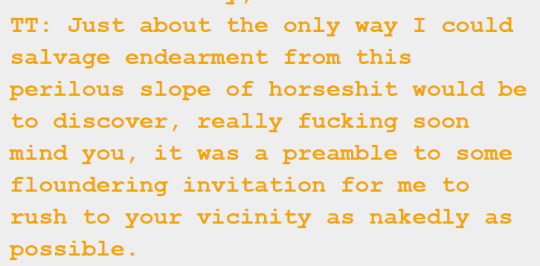
I think this hal message says enough about how bad dirk wished he could visit jake 💀💀
#Yes.. yapping.. so fun.. i have so many things to yap on.. mwahaha..#brobot#dirkjake#jakedirk#jake english#dirk strider#homestuck#my art#Anyway guys all of dirks splinters are intrinsically tied to his love for jake because its an immutable part of his existence-#As a fictional character within a story. Shoutout narrative soulmates hashtag literally because theyre not real#daniel talks#IM SO TIRED GOING TO BED. AAH.
475 notes
·
View notes
Text

May you feel the jaws of the beast at your throat every time you swallow
#dgs#dgs2#dgs2 spoilers#dai gyakuten saiban#tgaa#tgaa spoilers#the great ace attorney#ace attorney#klint van zieks#j's art#guy who dropped the rawest line in fiction and then proceeded to haunt the narrative
819 notes
·
View notes
Text
the thing is, i love The Narrative, but i also absolutely adore a truly character-focused tragedy where everyone’s downfall is caused not by larger narrative forces, but by hundreds of tiny decisions made by characters who, despite their best efforts, just suck.
#like. The Narrative is inherently a factor in every story because that’s how fiction works#there is ALWAYS a writer pulling the strings#but sometimes characters are written SO well that you legitimately forget#and you can just focus 100% on them and their choices#most characters can’t make choices but some characters are so good that they can#i can only think of a few examples of this - but it is real and i stand by that#there are stories that were created plot-first#where the author had a plot in mind and then made up characters to play it out (who are controlled by The Narrative they were forced into)#and then there are stories that were created character-first#where the author made up some fucked up characters and then let them loose to see what they would do#and THAT is some good stuff#and like. tbf i have ABSOLUTELY no idea if the story i’m thinking of was created that way - but it just feels like it#because the characters feel so much like real people#it’s fucked up. i love it
1K notes
·
View notes
Text
modern au; nonbinary steve
dustin bullies steve into playing their favorite MMO with them. to Dustin's disgust, Steve's favorite part is collecting all the different cosmetic items and making cool fantasy outfits for his avatar. unbeknownst to the party, steve creates an alt account where he can collect the female outfits and wigs, because there's a bigger selection and they're much prettier.
as Steve interacts w people on his new account, he realizes he likes it better-- for one, people pay attention to women in a way he isn't used to. not all of it is good attention, but steve relishes in it. also, he likes that people see him as a woman. he likes that they don't even think about it. quickly he joins a guild and actually starts playing the game in earnest, just so that he has these relationships with people who view and treat him as a woman.
he meets Eddie there. Eddie is charming and flirtatious with everyone, men and women, but it's clear that Steve is his favorite. Very carefully, Steve becomes closer and closer to Eddie-- close enough that Steve is full of guilt.
He feels like he's lying to Eddie about who he is, even though he's told the truth about everything but his gender. Even worse is the realization that he doesn't ever want Eddie to think of him as man-- which is confusing, because steve isn't exactly comfortable with someone he's falling in love with thinking of him as a woman.
Things get even worse when, after Steve drunk texts Eddie after a night out with Robin, they start sexting. Its fun, casual flirtation, nothing too serious, but Strve realizes he likes the idea of sex better as his alternate self. He likes pretending to have tits, he likes imagining what it would be like to have a cunt, he likes talking about wearing lingerie and being Eddie's good girl.
He thinks he can't come clean without losing the best thing he's ever had, so Steve pushes his guilt down and pretends he's not in love.
Of course he gets caught out, eventually. Dustin and Eddie become friends in real life and Eddie isn't an idiot. Steve is mortified and distraught, but once Eddie is sure that this wasn't all a cruel prank, he's quick to assure Steve that nothing has to change-- Knowing that in real life Steve has broad shoulders and a square jaw doesn't make him any more of a "man" than his online avatar makes him a "woman". Not if that's not what Steve wants.
So Steve doesn't have to give anything up. He gets to keep his amazing, supportive boyfriend. He gets to keep his pretty clothes and avatar. He gets to keep experimenting in the bedroom, finding out what makes him happy instead of what he thinks he should be doing.
And he gets more, things Steve never even dreamed of having: He gets to start buying pretty clothes in real life, too, and they hang next to his polos like they belong. He gets to grow out his hair. He gets to slowly find out what he likes, how he wants people to think of him, how he wants to think of himself.
#shut up az#steddie#catfishing in MMOs is a v common premise in East Asian m/m fiction#and I was reading like. The 12th one this year and thinking about what a narrative would look like if the catfishing wasn't done out of#Idk maliciousness or awkwardness but instead out of like a n exploration of gender#obviously someone in China isn't going to be allowed to write that but maybe one day I'll get a Japanese novel about it#however steddie seemed like a good conduit to get the thoughts put of my head
262 notes
·
View notes
Text
I genuinely do not understand the trope of antis making blanket statements about proshippers, lying about them, calling them pedophiles, whatever whatever but then getting mad when said people correct them in the notes?? Like ofc if you call someone a pedophile rapist groomer for shipping two siblings in fiction yes obviously they're going to correct you or get defensive?? I thought it was common sense.

#saw a post that was like “we HAVE to make post about proshits in private because if we don't they'll use their victim narrative” or#something and like????#😭😭😭#in the same post they said incest fanfic likers are akin to real preds and what#proship#comship#profic#anti anti#antis dni#darkship#profiction#proshippers please interact#pro fiction#proshipper
205 notes
·
View notes
Text







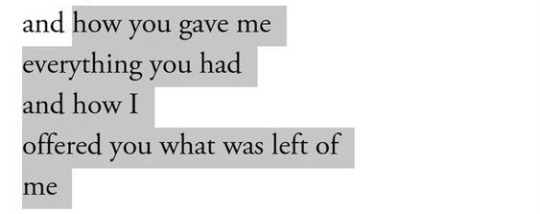

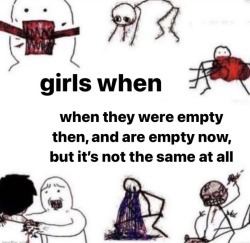
River— ᴀᴇsᴄʜʏʟᴜs, ᴛʜᴇ ᴏʀᴇsᴛᴇɪᴀ//@ɢᴏᴏsᴇᴋɪᴅ ᴘᴏsᴛ//ɴɪᴋᴏʟᴀʏ ᴅʏʙᴏᴡsᴋɪ ᴀɴᴅ ᴀʟᴇxᴀɴᴅʀᴀ ɢᴏʟᴜʙᴇᴠᴀ, ᴘᴀᴛʜᴏʟᴏɢɪᴄ 𝟸: ᴛʜᴇ ᴍᴀʀʙʟᴇ ɴᴇsᴛ//ᴡɪᴋɪᴘᴇᴅɪᴀ, ᴘʀᴏᴘʜᴇᴛɪᴄ ᴘᴇʀғᴇᴄᴛ ᴛᴇɴsᴇ//ʀɪᴄʜᴀʀᴅ sɪᴋᴇɴ, ᴘʟᴀɴᴇᴛ ᴏғ ʟᴏᴠᴇ//ᴄᴏɴᴏʀ ᴏʙᴇʀsᴛ, sᴀʟᴜᴛᴀᴛɪᴏɴs//ғʟᴏʀᴇɴᴄᴇ ᴡᴇʟᴄʜ, ɪ’ᴍ ɴᴏᴛ ᴄᴀʟʟɪɴɢ ʏᴏᴜ ᴀ ʟɪᴀʀ//ᴄʜᴀʀʟᴇs ʙᴜᴋᴏᴡsᴋɪ, ʀᴀᴡ ᴡɪᴛʜ ʟᴏᴠᴇ//ᴀᴍʏ ᴡᴏʟʟᴀʀᴅ, ʟᴀᴜʀᴀ ᴘᴀʟᴍᴇʀ ɢʀᴀᴅᴜᴀᴛᴇs//ᴅᴀᴠᴇ ᴍᴀʟʟᴏʏ, ᴛᴀɴɢᴏ ᴅᴀɴᴄᴇʀ.
#TO HAUNT AND TO BE HAUNTED……#it was always going to be this way etc etc#original fiction#web weaving#horror#time is a flat circle#doomed by the narrative#the stanley parable#circular narratives#in terms of similar vibes and inspirations…..#macbeth#the haunting of hill house#gone girl#better call saul#yellowjackets#sharp objects#jennifer’s body#the locked tomb#iron widow#lucy gray baird#mabel podcast#killing eve#preachers daughter#twin peaks
3K notes
·
View notes
Note
Hello 👋 I have a question about the new chapter and I couldn’t wait to ask it so here I am but please feel free to ignore this ask until public release to not spoil anyone.
How come M was suspicious towards the detective about their new power? They already know the scent of the detective’s blood so they should now they have no magic or it works differently perhaps? Their reaction made me so sad especially after all we went through 😭
Also I wish my detective was a panicked character because the scene where M calm them down… I need it for my stoic detective 😩
**BOOK FOUR DEMO SPOILERS AHEAD**
--
Mostly with M, or any of the vamps—particularly F, who is sensitive to magic—it's to do with needing the surprise for the moment in story-telling, hehe! :D
But in a story-sense, there was a lot of magic floating around the ritual site at that moment, so it would be difficult for them to distinguish just where it was coming from, especially as they're a bit panicked to make sure MC is ok!
Plus, the radiation aspect of the MC's powers weakens everything about the vampires, including their senses, so more difficult for them to pick up on nuances around this kind of magic.
But yeah, mostly because I wanted the impact of the surprise for that moment! ;D
I know what you mean! I do love the panicked scenes where the LI comforts the MC, because who doesn't love the drama and angst? :D
But then…some of my MC's would definitely be more down-to-earth and logical about the whole thing, so I just have to pick that option for them!
Thank you so much for the ask! :)
#the wayhaven chronicles#asks#interactive fiction#unit bravo#twc detective#romance#vampires#twc morgan#twc mason#narrative#twc book 4#the wayhaven chronicles book 4#spoilers#twc book 4 spoilers#demo#twc book 4 demo#hosted games#choicescript#choice of games#relationships
215 notes
·
View notes
Text
i don't think i've ever liked anything where "normal" familial relationships prevail because to me all the best media involves either an absent family/parent or one that's present but in a way that makes you wish desperately that they weren't. ideally both.
#🐉#for someone who hates the entire concept of family i sure do love to obsess over it in fiction#and dig under the floorboards of a narrative for signs of warped and twisted familial bonds (or lack thereof)
762 notes
·
View notes
Text
Easy Narrative Techniques That Spice Up your Works
Narrative Technique is, in simple words, the method a writer or author chooses to tell their story. It includes literary and fictional devices that assist greatly in writing literature or fiction.
In this post, I'm going to go into useful details about narrative techniques and how to play them out while writing your project. Here they are:
1. Setting:
You must've noticed that in genres like horror/mystery/crime the story is set in or restricted to just one place. This has an important impact on the protagonists and characters of your story. Settings play a huge role especially in the genre of crime/horror because the plot is carried out within those premises.
For example, in the movie Scream, the whole story is carried out in the town of Woodsboro, which is significant to note as it adds more thrill given that the killer is on the loose and within very close proximity.
Settings are also vital in genres like fantasy/adventure where the conflict is carried out in an unusual environment as it creates a sense of fight-or-flight hence gripping you into the story.
2. Cliffhanger:
Cliffhangers are common, and rightfully so because they are essential in a fair amount of stories. A cliffhanger is when the author ends a chapter or a book in suspense, often hinting at event that is due in the later part of the book or series.
Cliffhangers can either introduce the possibility of a newer event, or will create a gap before something is resolved, which makes your reader want more in order to find a solution. This encourages your reader to stick by and through, until a satisfactory answer is given.
Cliffhangers are also more effective in the genres of crime, horror, mystery, adventure, and fantasy. In genres like romance or slice of life, cliffhangers can be used, but it needs to be ensured that it doesn't deviate from the light-hearted mood of the story.
3. Multiperspectivity:
This one can be so interesting if used right. Multiperspectivity, as the name suggests, is when there are more than 1 or 2 perspectives in the story.
This pumps up the interest factor as different characters will see things differently. When you show the story being carried out in a variety of POVs, you give your readers the chance to read the story in a new light with every character.
This can also affect the plot, as different characters will have different goals by the end of the story. Multiperspectivity can also help you resolve conflict between different characters. In addition, you can use this to introduce a hidden villain/a hidden hero.
4. Sensory Detail:
Sensory details are the visual images you create for your readers while writing descriptions. This helps in the famous ‘show, don't tell’ and sensory details will visualise the scene for your readers.
This can also be paralleled with imagery (sight, touch, sound, taste, smell).
For example, imagine a hilltop. Instead of just writing about the fact that you see trees and the sun and some animals, you could put down your senses to make the description more visual. It would go like – “As she stood on the hilltop, her eyes took in the verdant swathes before her. The soft breeze tickled her skin while she basked in the warmth of the sun. Deer galloped across the lush, green grass, calling and prancing in carefree freedom. The scent of the earth hit her nose, and it was there that she felt she was home."
5. Foreshadowing:
It's common, it's effective, it's fun. Foreshadowing is when the author is implicitly trying to hint at a forthcoming event. It creates a suspicion in the reader's mind, which keeps the interest alive.
Foreshadowing and cliffhangers can be mixed to create a lot of questions in your reader's minds, which further keeps them hooked into your work.
6. Analepsis & Prolepsis:
Fancy words for plain terms. It's nothing but flashbacks and flash-forwards.
Analepsis (flashback) is when the author breaks the chronology of the story to bring light to an important event in the past. This either has an impact on the plot or the main character.
Prolepsis (flash-forward) is when the author breaks the chronology to go into the future. This can be used to highlight an important event (or events) that are likely to happen in the future.
It's important to note that these are not the same as time skips, which are just a leap from one time to another to not lose grip of the eventfulness of the story.
7. Chekhov's gun:
Chekhov's gun keeps your writing in check. Chekhov's gun is a principle that says any and every element in a narrative should have a purpose. If it doesn't, it get's removed.
Let's say you've introduced a character. Chekhov's gun requires you to assign a purpose to that character. Unless they are contributing to the story, they are useless. If they can have any sort of impact, then you keep them. If they don't, then they get executed from the plot. The same thing applies to objects as well. If your protagonist has found a box, something better come out of it or it's getting thrown in the trash.
8. Title Drops:
We love these, let's be honest. As the name suggests, title drops are when the author writes the name of the title in a line, or adds it in a dialogue, or uses it as a description to finish the story with a cherry on top.
Example: In the 90s romcom She's All That, there's a scene during their prom preparations where two guys are rapping and one of them says, "she's all that" as lyrics. This is a title drop.
9. Antithesis:
Antithesis uses two opposite ideas and puts them together to amplify the message you're trying to send. Antithesis can be done in two cases: contrast and parallelism.
With respect to CONTRAST, antithesis uses two polar opposites to highlight a certain point. For example: "In an instant, all the colour was gone. He was left with black. He was left with white." Here, you have ‘black’ and ‘white’ being used as opposite colours to signify the lack of vibrance.
With respect to PARALLELISM, antithesis puts forth a contradiction but in parallel structure. This means that the grammatical structures of your opposite phrases/sentences are the same. For example: "He was left with black. He was left with white." These two sentences have the same grammatical structure. Infact, the only difference between these two sentences is the colour, but then it amplifies the message.
I hope this helps those reading this. If you're a beginner or even stuck with your work, try implementing some of these to help yourself!
- ashlee
#writers on tumblr#writerscommunity#writing#books#writer#write#writingtips#creative writing#fanfic writing#tips and tricks#fiction writing#writing ideas#writing prompts#writeblr#writer stuff#writer things#writers#writing help#writing techniques#writings#writing fiction#fiction#novel#author#fanfics#writing tips#writing tricks#women writers#ao3 writer#narrative techniques
149 notes
·
View notes
Text

Decided to finally go through and size-up how much writing we've done for Episode 5 and it's apparently already 195,000 words long. It'll be about double that once it's done. Maybe more 🙃
For reference: Slay the Princess has ~158,000 words in total.
Episode 4 had ~185,000 words in total.
Anyways please bear in mind that this is the main reason it's taking us so gottang long to put this out. And when it comes, know that there will be much much much much much Content™ for you to explore!
895 notes
·
View notes